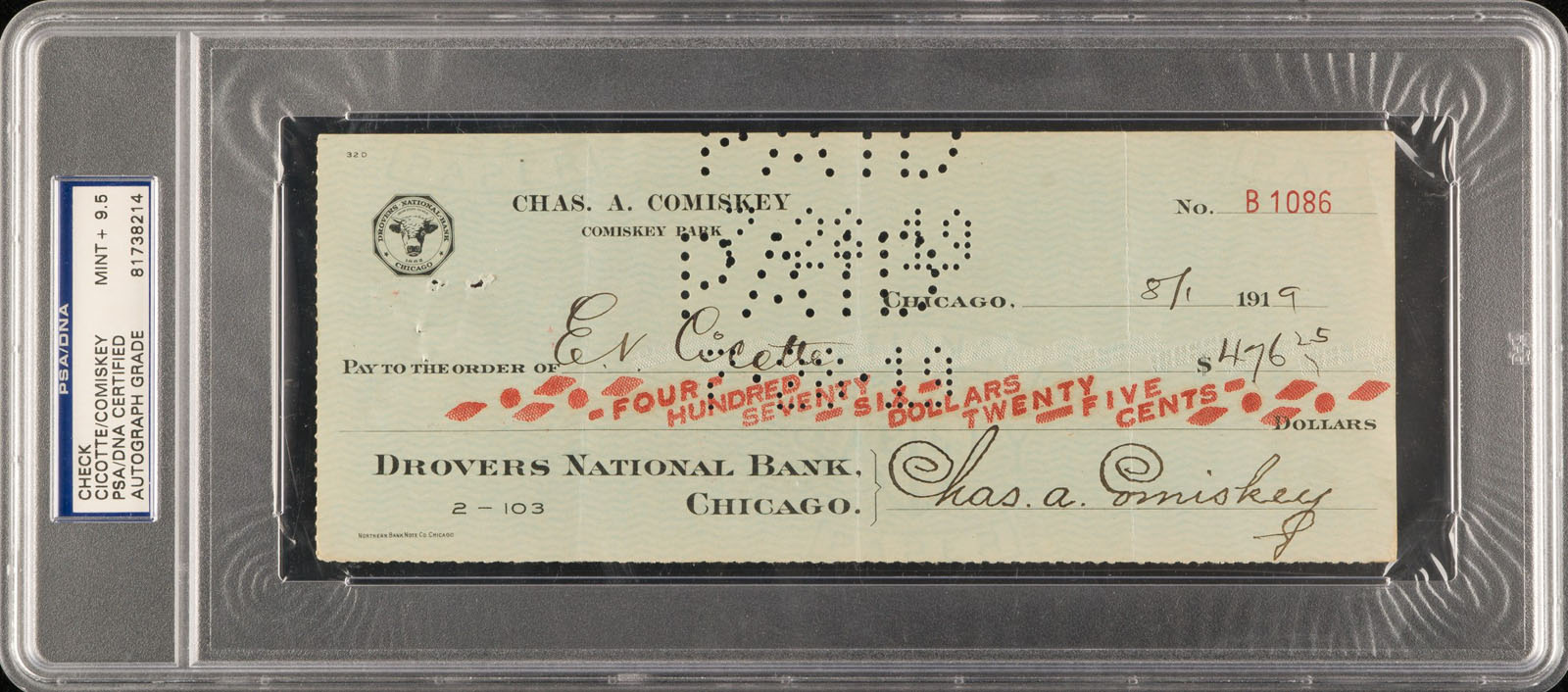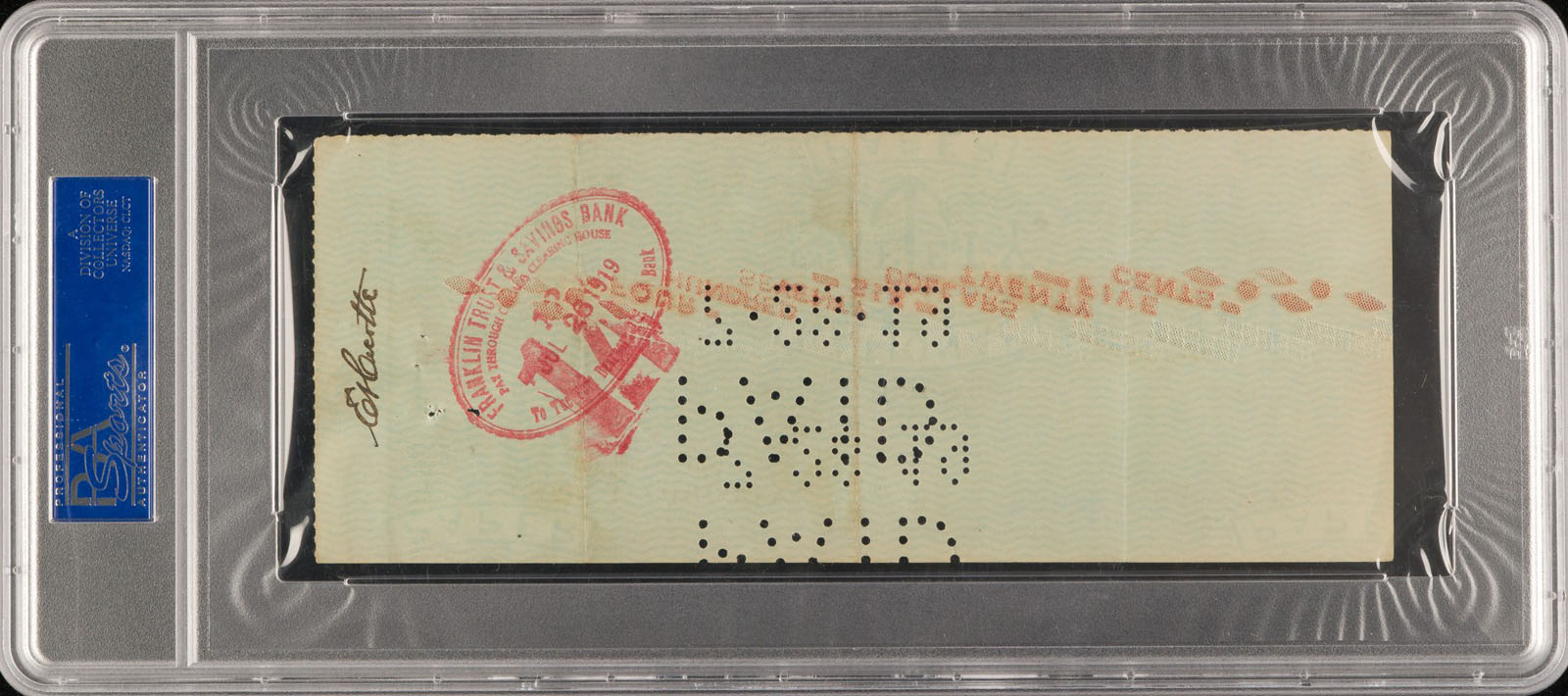Fall 2019 - Item detail
1919 Eddie Cicotte Endorsed Chicago White Sox Payroll Check Signed by Charles Comiskey PSA/DNA MINT+ 9.5 - Highest Graded!
- Sold For:
- $6,900
- Year:
- 1919
- Auction:
- 2019 Fall
- Lot #:
- 1868
- Category:
- Autographed Baseballs/Flats/Photos
Chicago White Sox payroll check issued to pitcher Eddie Cicotte, signed by both Cicotte (as an endorsement on the reverse) and team owner Charles Comiskey (on the front). PSA/DNA has encapsulated the check and graded both signatures MINT+ 9.5. This Cicotte payroll check is one of five we have seen dating from the historic 1919 season, all of which appear to have entered the hobby in 2007. Of those five checks, we know of three that have had the signatures graded by PSA/DNA. One was graded NM-MT 8, while the second was graded NM-MT+ 8.5. The third, which is the offered check, merited a near-perfect designation of MINT+ 9.5, making it the highest-graded example of the trio. The check, dated August 1, 1919, and drawn on the Drovers National Bank of Chicago, Illinois, is made out to "E. V. Cicotte" in the amount of $476.25. It has been signed in black fountain pen along the base by "Chas. a. Comiskey." Endorsed by "E. V. Cicotte" in black fountain pen on the reverse. The name "Chas. A. Comiskey" and "Comiskey Park" are preprinted along the top left border. The check (8.5 x 3.5 inches) displays normal bank cancellation stamps and holes (none of which affect either of the signatures), as well as three vertical folds and two staple holes in the upper right corner. In Very Good condition overall.
The historical significance of this check cannot be overstated. Both Cicotte and Comiskey played major roles in the infamous 1919 "Black Sox" scandal, during which eight members of the White Sox conspired to "throw" the World Series. Although Cicotte was not the ringleader of the conspiracy (that role went to Chick Gandil), he was one of the first conspirators to join the group, and, as the team's mound ace, the most important. It was Cicotte who opened the Series for the White Sox by hitting Reds leadoff batter Morrie Rath, which was the signal to the gamblers that the fix was on. Cicotte lost his first two starts in the Series, and it wasn't until he found out that some of the other conspirators had not yet been paid, that he returned to form and won Game 7 (the Series was a best of nine). Under threat of physical harm, fellow conspirator Lefty Williams ended the Series the next day by losing 10-5, which marked his third loss in the Fall Classic. Cicotte and Williams were the only two White Sox pitchers on the take in the Series, and, not surprisingly, they suffered all five losses for Chicago.
While Comiskey had no active role in the fix, his penurious ways with regard to player salaries fostered a culture of resentment that made it easy for many of the players to join the conspiracy. Even though the White Sox were one of the most talented teams in the league and had won the 1917 World Series with basically the same roster as that in 1919, Comiskey "rewarded" his players with some of the lowest salaries in the league. Cicotte had even more reason than most of his fellow players to feel slighted in 1919. Prior to the start of the season, Comiskey promised Cicotte a bonus of $10,000 if he won 30 games or more (Cicotte's salary in 1919 was $5,712). Unfortunately for Cicotte, he finished the year with 29 wins and Comiskey resolutely stuck to the letter of the deal, refusing to compensate him in even a small way for his spectacular season. It was an especially ill-timed affront for Cicotte because he was experiencing serious financial hardships at the time. Cicotte was basically supporting a family of 12 under one roof, which included not only his wife and three kids, but his wife's parents, his brother and wife, and his brother-in-law's family. The $10,000 bonus amount must have weighed heavily on Cicotte's mind, because during his first meeting with Gandil regarding the fix Cicotte told him that he wouldn't consider doing it for anything less than $10,000. He also told Gandil that he had to have the money, in full, before the Series started. The next night Cicotte found $10,000 cash under his pillow, and the die was cast. Reserve $2,500. Estimate (open).
The historical significance of this check cannot be overstated. Both Cicotte and Comiskey played major roles in the infamous 1919 "Black Sox" scandal, during which eight members of the White Sox conspired to "throw" the World Series. Although Cicotte was not the ringleader of the conspiracy (that role went to Chick Gandil), he was one of the first conspirators to join the group, and, as the team's mound ace, the most important. It was Cicotte who opened the Series for the White Sox by hitting Reds leadoff batter Morrie Rath, which was the signal to the gamblers that the fix was on. Cicotte lost his first two starts in the Series, and it wasn't until he found out that some of the other conspirators had not yet been paid, that he returned to form and won Game 7 (the Series was a best of nine). Under threat of physical harm, fellow conspirator Lefty Williams ended the Series the next day by losing 10-5, which marked his third loss in the Fall Classic. Cicotte and Williams were the only two White Sox pitchers on the take in the Series, and, not surprisingly, they suffered all five losses for Chicago.
While Comiskey had no active role in the fix, his penurious ways with regard to player salaries fostered a culture of resentment that made it easy for many of the players to join the conspiracy. Even though the White Sox were one of the most talented teams in the league and had won the 1917 World Series with basically the same roster as that in 1919, Comiskey "rewarded" his players with some of the lowest salaries in the league. Cicotte had even more reason than most of his fellow players to feel slighted in 1919. Prior to the start of the season, Comiskey promised Cicotte a bonus of $10,000 if he won 30 games or more (Cicotte's salary in 1919 was $5,712). Unfortunately for Cicotte, he finished the year with 29 wins and Comiskey resolutely stuck to the letter of the deal, refusing to compensate him in even a small way for his spectacular season. It was an especially ill-timed affront for Cicotte because he was experiencing serious financial hardships at the time. Cicotte was basically supporting a family of 12 under one roof, which included not only his wife and three kids, but his wife's parents, his brother and wife, and his brother-in-law's family. The $10,000 bonus amount must have weighed heavily on Cicotte's mind, because during his first meeting with Gandil regarding the fix Cicotte told him that he wouldn't consider doing it for anything less than $10,000. He also told Gandil that he had to have the money, in full, before the Series started. The next night Cicotte found $10,000 cash under his pillow, and the die was cast. Reserve $2,500. Estimate (open).


